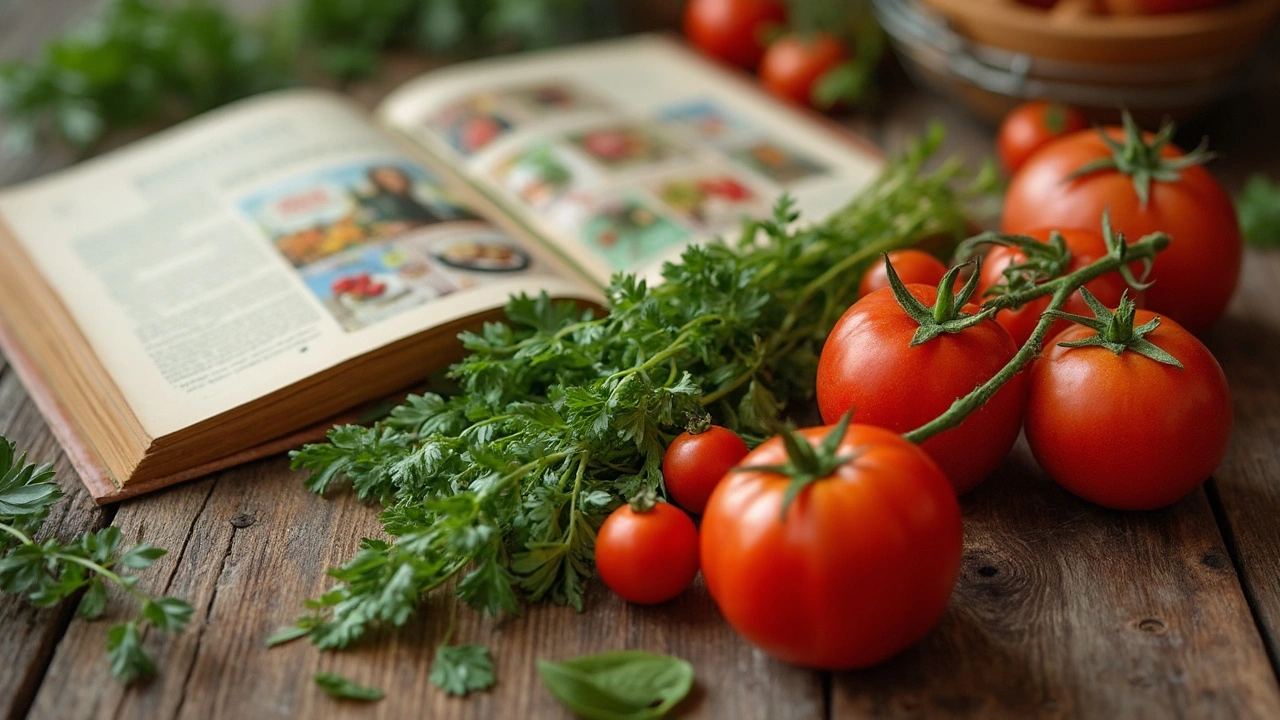Ever notice how the kitchen transforms into a whole different world when you slow down and engage all your senses? These days, it's easy to rush through cooking like it's just another chore on the list. But what if we made cooking something special again, almost like a mini retreat amidst the chaos of everyday life?
Imagine kneading dough and feeling the texture shift beneath your fingers or slicing a ripe tomato and experiencing the juicy burst as a mini gateway to mindfulness. It's not just about whipping up dinner; it's about being there, present for every sizzle and aroma. Slowing down and letting yourself savor the process can turn cooking into a joyful experience that nourishes more than just your body. It's like giving both your mind and your taste buds a much-needed break.
And no, you don't need a fancy kitchen or gourmet ingredients to make it happen. It's more about the mindset and how you approach cooking. Whether you're alone or having a light-hearted chat with your partner while prepping, like Malcolm and I often do, mindfulness can bring a whole new level of joy and connection to the kitchen.
- The Art of Mindful Cooking
- Engaging the Senses
- The Ingredients' Journey
- Slowing Down in the Kitchen
- Bringing Joy to Cooking
- Practical Tips for Mindful Cooking
The Art of Mindful Cooking
Diving into the art of mindful cooking starts with shifting our mindset about what cooking really is. Instead of seeing it as a task, consider it as a journey where each step from prep to plate is an opportunity to be present. Think of it like yoga, but for your taste buds and senses!
The first step is to get rid of distractions. Yep, that means putting your phone on silent and turning down the TV. The kitchen doesn't have to be a silent monastery, but keeping things calm helps you focus on what you're doing. Feeling the rhythm as you chop or stir can be incredibly grounding.
When you're cooking, let your senses take the lead. Listen to the sizzle of onions hitting the hot pan. Breathe in the fresh scent of chopped herbs, and notice the vibrant colors of your ingredients. It’s not about getting it all perfect but experiencing the moment fully.
Mental clutter often shows up in the form of racing thoughts about what’s next on your agenda. Gently steer your mind back to the ingredients in front of you. The vibrant red of a pepper or the earthy smell of garlic can be more than just stimuli; they remind us to appreciate the little things.
Research has even shown that being present while cooking can reduce stress and increase satisfaction in meals. Here's a quick table on how it impacts well-being:
| Activity | Impact on Stress | Impact on Meal Satisfaction |
|---|---|---|
| Distracted Cooking | High | Low |
| Mindful Cooking | Low | High |
Incorporate pauses into your cooking routine. Take a moment to appreciate where the ingredients have come from. From the farmer's fields to your kitchen counter, each piece of produce has its own story. Imagine the sun, rain, and care that went into its growth.
So next time you're in the kitchen, challenge yourself to slow down and relish each moment. After all, cooking isn't just about feeding your stomach; it's about nourishing your soul too.
Engaging the Senses
When you think about cooking, do you think about all the senses you're using? Taking in the sights, sounds, smells, and even the feeling of the ingredients can pull you into the present moment, transforming cooking into a meditation. It's like a sensory workout, and all you need is a little awareness to unlock it.
Let's break it down. Start with sight: notice the colors and shapes of what's in front of you, like the vibrant red of a fresh bell pepper or the glistening surface of olive oil as it heats up. These details can transform a routine task into something extraordinary.
Then there's the sound—sizzling onions or the rhythmic chop of a knife. These aren't just background noise; they're part of the play. Let them remind you where you are and what you're doing.
And smell? Don't even get me started. The aroma of garlic frying in butter or basil being torn apart is basically a mindfulness bell. It calls you into the here and now, making you appreciate what's happening as it unfolds.
Don't forget touch. Feel the ripeness of a tomato or the firmness of a potato. Engage with every texture and temperature. It's an invitation to be present and savor that moment of creation.
Finally, taste. Of course, tasting is part of cooking and living. But also, consider tasting as a moment to pause and reflect. Each flavor, from the tanginess of the lemon to the richness of chocolate, is a reminder of the joy and presence cooking can bring to life.
By weaving these sensory experiences together, you create a richer, more immersive cooking environment. Mindfulness in cooking is not just a practice for peace; it's a celebration of life and all its flavorful intricacies.
The Ingredients' Journey
Ever thought about the journey your ingredients take before they hit your kitchen counter? It's a little like an epic quest but for food. When you're trying to add a dash of mindfulness to your cooking, it can be eye-opening to think about where each ingredient comes from.
Take that simple carrot. It started as a seed somewhere in a field, endured all sorts of weather, was harvested, and traveled miles just to end up on your cutting board. Our everyday ingredients often come from incredible distances. In fact, many fruits and veggies in the US travel several hundred miles before reaching our stores.
Understanding and appreciating this process can make cooking feel like you're holding a small piece of the world in your kitchen. That carrot isn’t just a vegetable anymore; it’s a story of nature, of people farming, harvesting, and transporting it—all leading up to the moment you add it to your soup.
To dive deeper into this journey, try visiting a local farmer's market. You'll often find the farmers themselves selling their produce, eager to share how it was grown. Not only does this help support local agriculture, but it also gives you a chance to ask questions and maybe pick up some unique produce that you're not used to seeing in the supermarket.
Here's a little tip to make the most of this: next time you’re cooking, pause for a moment as you pick up each ingredient. Imagine its journey. Take a sniff, feel the texture, and think about how it got there. Just these few seconds can transform cooking from a routine task into a thoughtful, joyful experience. Who knew carrots could be so inspiring?

Slowing Down in the Kitchen
Life’s on fast-forward for most of us, but the kitchen doesn’t have to be part of that rush. Embracing a slower pace when cooking can not only enhance the flavors of your meals but also transform the act of cooking into a calming ritual. It sounds simple, but it requires a slight shift in how you think about your time and tasks.
For starters, plan out your meal with intention. Instead of grabbing the first recipe that pops up on your phone, take a moment to choose something that excites you. Maybe it's a dish that reminds you of home or a new recipe you've been curious to try. Choosing with thought means you’re already putting mindfulness into action.
When you begin cooking, focus on the process and not just the end result. This means unplugging from distractions. Put your phone away or switch it to silent mode, give yourself that break. And here’s a tip: screenshot your recipe if needed, then set it aside. That way, you’re not tempted to check social media or emails while cooking.
Engage with each task as you go. Notice the color of the vegetables as you chop, listen to the rhythm of the knife, and the way ingredients sizzle when they hit the pan. Use this time to engage the senses, and you’ll find that the act of cooking becomes much richer.
If you’re thinking about multi-tasking, steer clear! Multi-tasking might sound efficient, but it can dilute your experience and increase stress. Instead, take it one step at a time. Not only will your dishes likely turn out better, but you'll also feel less overwhelmed.
- Mindfulness Tip: Try tasting each ingredient before combining them. It’s a fun way to understand how flavors come together, and it roots you in the moment.
If you need a bit more convincing, consider this little nugget: Experts have found that slowing down can reduce stress levels and increase overall satisfaction with meals. A calmer state while cooking can even lead to better digestion. Your gut will thank you for taking it slow!
Bringing Joy to Cooking
Cooking doesn't have to just be about getting food on the table. It's also an opportunity to find some joy and presence in what might otherwise be just another task. By embracing mindfulness during meal prep, you can turn your kitchen time into something more rewarding.
Let's start with music. Ever tried cooking while listening to your favorite tunes? It can change the whole vibe. Those upbeat playlists or even the smooth classics can make chopping veggies feel less mundane and more like a little dance with rhythm. Just make sure the volume is right—not so high that you can't focus on the cooking itself but just enough to add a touch of fun.
Another tip? Get into the habit of appreciating each ingredient. Think about where it came from and the journey it took to reach your kitchen. When you're peeling a carrot, for instance, take a moment to admire its vibrant color and fresh scent. It sounds like a small thing but noticing the details can bring a surprising amount of joy and gratitude.
Cooking with others can multiply the joy, too. Whether it's with your partner, like I often do with Malcolm, or inviting a friend over, sharing the cooking process creates beautiful memories. It's about those little conversations and laughs shared over simmering pots rather than just the end result.
- Set the atmosphere: use music, dim lights, or candles to make the space inviting.
- Involve others: cooking together can be a bonding experience.
- Find pleasure in small tasks: savor the aroma of spices and the vivid colors of veggies.
- Celebrate your creations, no matter how simple—they're a reflection of your effort and creativity.
Finally, remember that joy comes in the process, not just the outcome. Whether it's plating your creation with a sprinkle of herbs or simply admiring the table you've set, each step is a chance to appreciate the moment you're in. Finding presence can make even the simplest of meals a joyful experience.
Practical Tips for Mindful Cooking
Cooking mindfully can really change your kitchen vibe, turning meal prep from a rushed task into a calming ritual. Here are some straightforward tips to help you embrace mindfulness while you cook.
First off, try setting a calming atmosphere. A little background music or natural light can make a huge difference. Start by taking a deep breath before you dive into the cooking process, focusing on the sensations around you.
Engage your senses fully. As you chop, sauté, or bake, pay real attention to the colors, textures, and sounds. Feel the smoothness of a ripe avocado or listen to the cheerful sizzle of onions on the stove. Not only does this make cooking more enjoyable, but it also helps keep you anchored in the moment.
Simplify your space. Keep your kitchen organized to reduce distractions. Having all your ingredients ready before you start, known as mise en place, can do wonders for keeping your mind focused on the task at hand.
Ever heard of single-tasking? It's pretty much the opposite of multitasking. When you're cooking, try to keep your focus on just one thing at a time. Chopping veggies? Just chop veggies. Boiling pasta? Just focus on boiling pasta. It’s like giving each task its own spotlight.
Appreciate the journey your ingredients have made to get to your kitchen. It sounds a bit romantic, but thinking about where they come from—farm to table—can add depth to your cooking experience and might even make the food taste better, weirdly enough.
Incorporate gratitude into your routine. It could be something as simple as saying thanks to the universe before you dive into your meal or appreciating a farmer's hard work who grew your veggies. This can foster a deeper connection to your food.
Lastly, share the experience. Invite a friend over to cook with you or involve your family. The act of cooking can be a bonding experience filled with laughter and stories, making the whole mindfulness journey even more enjoyable.
With these tips, you can turn your kitchen into a haven of calm and joy, making cooking something to look forward to rather than a part of your daily grind.





